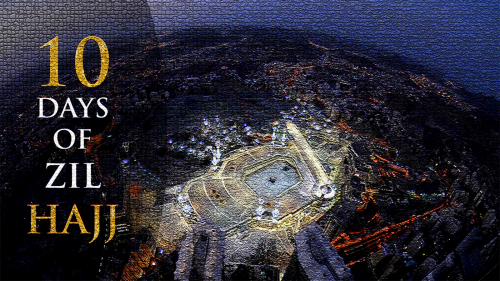Laylat al-Qadr and Shavuot Are Timeless Revelations

Ramadan is the month when the Sacred Scriptures of Jews, Christians, and Muslims were first revealed: Wathila ibn Al-Asqa reported:
The Messenger of Allah said, “The scriptures of Abraham were revealed on the first night of Ramadan. The Torah was revealed after six nights of Ramadan had passed. The Injil [Gospel] was revealed after thirteen nights of Ramadan had passed. The Criterion [Quran] was revealed after twenty-four nights of Ramadan had passed.” (Musnad Ahmad 16536, graded Hasan according to Al-Suyuti). Other Hadith also mention that the Psalms of David were revealed on the eighteenth night of Ramadan.
So Ramadan is a good time, for all those who worship the One and Only God, to seek an understanding of how our Sacred Scriptures relate to one another. There are several similarities in custom, language and philosophy between the Jewish holy day of Shavuot and the Muslim holy day of Laylat al-Qadr.
Both holy days commemorate the beginning of the revelation that formed the foundation of their respective Jewish or Islamic religious communities. And both holy days celebrate the timeless nature of divine revelation.
Laylat al-Qadr is one day in the last ten days of Ramadan. It is not a even date because even numbers are always divisible. Most Muslims say it is the night of the 27th day of Ramadan. Others say it is the 23rd night of the day of Ramadan.
The number 23 is a prime number. A prime number like 23 is divisible only by 1 and the number itself. For a number to be classified as a prime number, it should have exactly two factors. Since 23 has exactly two factors, i.e. 1 and 23, it is a prime number.
While God wants there to be more than one monotheistic religion, he does not want there to be hostile, disrespectful, sects within each monotheistic religion. This is also a truth for the Muslim Night of Power.
The Torah also does not give Jews a fixed date for the Shavuot holy day that celebrates the Giving of the Torah at Mount Sinai. Instead Jews have to count seven weeks of days (49 days) to get to the day the Ten commandments (actually ten statements in Hebrew) were given because Shavuot is both a specific event marking the anniversary of the covenant made between God and the nation of Israel; and a experiential process like falling in love or becoming wise, which rarely occur at a specific time or place.
There is a great difference between celebrating a birthday; and celebrating a lifetime. A wedding ceremony is an important day because it focuses attention on the much longer and more complex process of forming and maintaining an ongoing loving relationship.
Of all Jewish holidays, Shavuot is the most expressive of the dynamic and pluralistic values of Judaism, Shavuot began as an agricultural holiday marking the end of a seven week period when the first fruits of the spring grain harvest were brought to the temple in Jerusalem.
“From the day after Shabbat, from that day you shall bring the (Omer) sheaf for waving offering: you are to count seven full weeks, until the day after the seventh week, count fifty days; then present a new grain offering to the Lord." (Leviticus 23:15-16)
In Talmudic times Shavuot became the occasion for celebrating Mattan Torah, God's gift of Torah to Israel, and not long after that Jewish mystics began to spread the view that what happened at Sinai was actually a marriage commitment between God and Israel; with Torah being the covenantal Ketubah wedding contract.
For modern Jews trying to understand the meaning of an evolving revelation, religious pluralism, a God who chooses and a chosen people; Shavuot, the only Jewish holiday where the Torah does not give us an explicit fixed date, is an ideal way to gain insight. This is also true for the Muslim Night of Power.
I know the exact day when I and my wife were married. I do not know the day, the week or even the month, when I fell in love with her. A wedding is a specific event that can be observed.
Forming a loving commitment is an ongoing process that must be experienced. This is why the only Jewish holy day that does not have a proscribed specific date is Shavuot a day that commemorates the beginning of the partnership-marriage covenant commitment between God and Israel.
Being chosen is an event; choosing is a process. One day, propelled by my growing love for my beloved, I proposed marriage. Two weeks later, she finally said 'Yes'. Four months later, on December 25, 1966 we were married.
During the following fifty seven subsequent anniversary celebrations our love has continued to grow. Experiencing each additional anniversary is more significant than our original wedding day. The consequences of the choice seem to be more important than the original choice itself; provided the choice was the right one.
Yet without the choice to make the commitment, love would be unexpressed and unrequited: a terrible loss for both partners.
Shavuot is a transhistorical experience like Shabbat or al-Jumuah, and not a historical event like Passover or Hanukah. Al-Jumuah, Shabbat and Shavuot celebrate a continual ongoing spiritual process of personally experiencing a day of wholeness and holiness within a sacred framework.
For Jewish mystics every Jewish marriage that is destined to last, is a reenactment of the marriage of God and Israel at Sinai.
Shavuot celebrates the yearly anniversary of Israel's first intimate experience of God, as Prophet Hosea proclaims God's vow: “I will betroth you (Israel) unto Me for ever; yes I will betroth you to Me in righteousness, in justice, in lovingkindness, and in mercy. I will betroth you to Me in faithfulness; and you shall know the LORD” (2:21-22)
Finally the Mishna explicitly states that the first chapter on the Merkava (chariot) in the Book of Ezekiel should not be read in public. However, in contravention of the Mishna's prohibition, the chariot chapter is traditionally read publicly in all synagogues on Shavuot. Why?
After the awesome Giving of the Torah to the whole People of Israel, the Holy One invites more than seventy of the leaders of the Jewish People to come up to the top of Mount Sinai to have a simple, private experience of the Divine presence: “seventy of the elders of Israel saw the God of Israel; and under His feet there appeared to be a pavement of sapphire, clear as the sky itself.” (Exodus 24:10).
This much more complex, many metaphors vision of God’s awesome presence found in the first chapter of Prophet Ezekiel is a vast expansion of the minimalist Exodus account. One verse which applies to our theme states:
“Above the canopy spread out over their heads, there appeared something reminiscent of a throne (The Quran mentions the throne some 25 times (33 times as Al-ʽArsh), such as in verse 10:3 and 23:116), resembling a sapphire form. There was a likeness, of the appearance of a human being seated on the likeness of the throne high above.” (1:62)
The Orthodox Metsudat David commentary says “the likeness of the appearance of a human being” Prophet Ezekiel envisioned was the Shekinah (Sakina), the famine presence of the Divine One.
Topics: Interfaith, Night Of Power (Laylat Al Qadr)
Related Suggestions

















